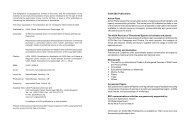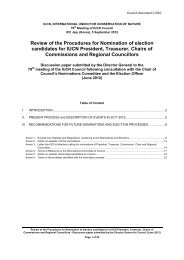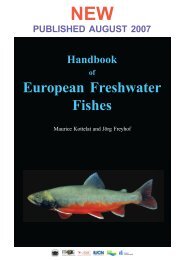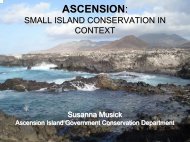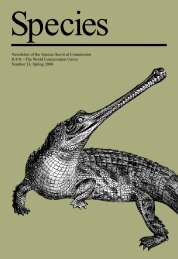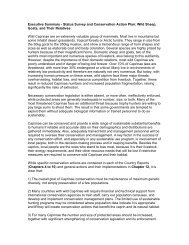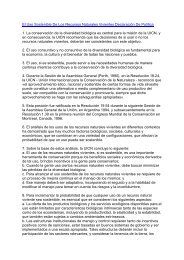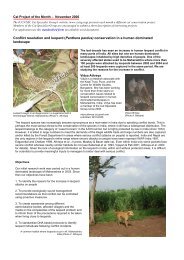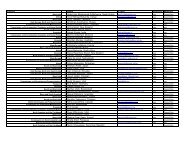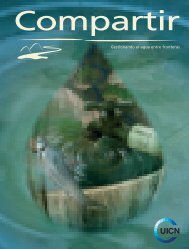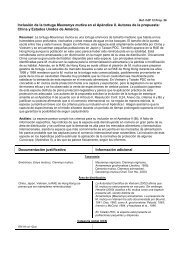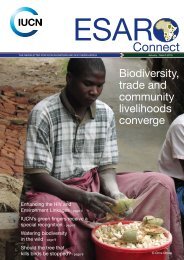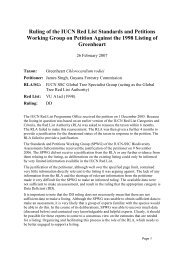Planning education to care for the earth - IUCN Knowledge Network
Planning education to care for the earth - IUCN Knowledge Network
Planning education to care for the earth - IUCN Knowledge Network
Create successful ePaper yourself
Turn your PDF publications into a flip-book with our unique Google optimized e-Paper software.
<strong>IUCN</strong> <strong>education</strong> in Sahel and West Africademand from teachers <strong>for</strong> teaching aids and documentation as well astraining. Partnership with o<strong>the</strong>r organizations involved in <strong>the</strong> training ofteachers may be envisaged.Experience in Mali has shown that it is possible in environmental <strong>education</strong><strong>to</strong> work in collaboration with associations linked <strong>to</strong> <strong>the</strong> social and culturalheritage. The use of traditional means of expression <strong>to</strong> convey symbolically<strong>the</strong> environmental message may initiate changes in behaviour and lead <strong>to</strong>new action. Likewise, in rural areas, youth associations and clubs need <strong>to</strong> beencouraged, and ef<strong>for</strong>ts should be made with <strong>the</strong> Koranic schools. Radio hasbeen used experimentally, and is a medium with potential <strong>for</strong> <strong>the</strong>dissemination of environmental messages.ConclusionDevelopment programmes risk failure if <strong>the</strong>y do not take in<strong>to</strong> account<strong>the</strong> experience of <strong>the</strong> people <strong>the</strong>y are designed <strong>to</strong> benefit. It isnecessary <strong>to</strong> listen <strong>to</strong> <strong>the</strong> people <strong>to</strong> understand <strong>the</strong>ir behaviour <strong>to</strong>wardsnatural resources, and <strong>the</strong> essential fac<strong>to</strong>rs have <strong>to</strong> be appreciatedbe<strong>for</strong>e any action is taken.The importance of environmental <strong>education</strong> is not <strong>to</strong> impose a way ofthinking, but <strong>to</strong> clarify and deepen <strong>the</strong> understanding of people of <strong>the</strong>environment in which <strong>the</strong>y live and <strong>the</strong> problems <strong>the</strong>y face, <strong>to</strong> create aclimate in which <strong>the</strong>y will find appropriate solutions through changesof attitude and behaviour, and through <strong>the</strong> application of simpletechniques and practices.Lessons learnedI learned that <strong>for</strong> success in EE I have <strong>to</strong>:•listen and understand <strong>the</strong> knowledge, and <strong>the</strong> priorities of <strong>the</strong>people;•involve all <strong>the</strong> partners from <strong>the</strong> bot<strong>to</strong>m <strong>to</strong> <strong>the</strong> <strong>to</strong>p from <strong>the</strong>beginning and all through <strong>the</strong> process;•take in<strong>to</strong> account <strong>the</strong> traditional ways of communication, of passingon knowledge, skills, and cultural heritage. EE has <strong>to</strong> become <strong>the</strong>irprogramme, <strong>the</strong>ir new way of thinking and behaving, <strong>the</strong>y have <strong>to</strong> beable <strong>to</strong> reproduce it, <strong>to</strong> transfer <strong>the</strong> knowledge and technology in<strong>the</strong>ir own words and actions.Fur<strong>the</strong>r Reading<strong>IUCN</strong> 1991. Walia: The Approach Practical Guidelines, <strong>IUCN</strong> Gland,Switzerland. In French and English, available free.83



